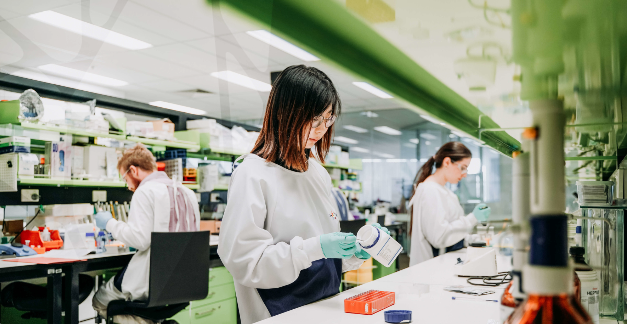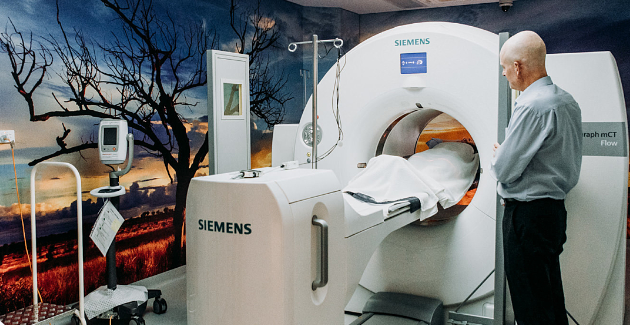SAHMRI is South Australia’s independent, not-for-profit health and medical research institute. It sits at the nexus of health and medical research in South Australia, facilitating diverse and innovative collaborations that deliver better, more equitable, health and health care to people across the state and beyond.

SAHMRI was created in 2009 to bring focus and scale to the health and medical research industry in South Australia. Innovation and collaboration are central to SAHMRI’s vision to conduct inspired research leading to better health for all. The organisation works closely with South Australia’s three major universities and is embedded within the state’s major public hospitals to ensure its research is driven by clinical needs and leads to clinical improvements.
By the time SAHMRI begun operations in late 2013, it had already made an indelible mark on Adelaide through its iconic headquarters, – nicknamed ‘The Cheesegrater’ because of its thousands of distinctive triangular window hoods.
The Cheesegrater was far more than just an architectural statement. It spoke to the embryonic institute’s desire to innovate; to challenge norms and to do things because they were what was needed, not what was easy or expected.
Just a Quick Note:
InnovationsOfTheWorld.com has partnered with Trade License Zone (TLZ) to support global innovators looking to expand internationally. Take advantage of the UAE’s Free Zones—enjoy streamlined setup, low corporate taxes, and a strategic gateway to the Middle East and beyond.
Get Your UAE Free Zone License Fast & Easy!
The building’s 15,000+ windows speak to the very DNA of SAHMRI. It is an institute that wants the world to look in, to be curious about, and to direct, the work that it is doing. Similarly, SAHMRI’s researchers are expected to look out at the community they live in as a constant reminder of why the work they do is so essential.

The extraordinary diversity of SAHMRI’s research agenda is rare among health and medical research institutes globally. SAHMRI is home to groups investigating diabetes, cancers, heart disease, dementia, mental health and wellbeing, perinatal conditions, Indigenous health issues, visceral pain and much more. These disparate targets for research are, however, bound by a common denominator – they are the most common health challenges that people everywhere are facing today

The power to measure and improve healthy ageing
Imagine a simple test that could reveal how well you are ageing. A research team at SAHMRI, led by Dr Tim Sargeant, has developed a blood test that is a giant step in that direction. It is a test to measure autophagy which, in simple terms, is the recycling system that operates within every one of our cells, every second of every day. It makes sense that the better our cellular recycling system is operating, the healthier we are. The gradual decline of our autophagic system over time is a key factor in what people generally refer to as ‘ageing’.
This innovative blood test measures the effectiveness of a person’s autophagy system at any point in time. Better yet, it can be measured regularly allowing for comparisons – and opening the door to an enormous array of clinical trials to investigate the impact that a particular intervention can have on autophagy. Already, the team is involved in a trial to determine the impact protein has on autophagy, while another is testing how autophagy is affected by dietary interventions like intermittent fasting and caloric restriction.
And that’s just the beginning of what’s potentially possible thanks to this world-first blood test.

A simple solution for a better start to life
Preterm birth can cause complications that have an acute impact on a baby’s start to life, and the wide-ranging effects can persist well into adulthood.
Despite rapid advancements in health care and medical knowledge, the prevalence of preterm birth across the world has shown few signs of improvement … until now.
SAHMRI’s Women and Kids theme, under the guidance of Professor Maria Makrides, has discovered that omega-3 – the readily available, inexpensive, easy to administer nutrient – can play a major role in helping babies arrive on time.
Like many of the world’s great discoveries, this one was more serendipitous than by design.
Professor Makrides’ team had been investigating the association between omega-3 and cognitive benefits for newborns. While analysing data, researchers identified a stunning and unexpected trend among – participants who received omega 3 supplements showed a distinct reduction in preterm births.
Armed with this information, Professor Makrides and her team conducted a systematic review scouring the globe for any clinical trials involving pregnant women who had been given omega-3 supplements. The review supported the hypothesis that a pregnant woman’s omega-3 level is an important factor in helping carry their baby to full term.
But questions remained about who could benefit and how those people could be identified.
Several more years of painstaking research unlocked the answers, with Professor Makrides’ team developing a simple blood test to measure a pregnant mum’s omega-3 levels, with supplementation recommended for those who are low.
This knowledge is now being further tested with a real-world trial across South Australia. It’s a trial that jurisdictions across the globe are watching with interest, with a view to rolling out the program for their populations.

More effective cancer treatment with fewer side effects
One of the most insidious aspects of cancer is that the treatment can be worse that the disease itself.
Proton therapy is at the vanguard of radiation options to treat solid cancers, delivering a concentrated, highly precise dose that targets the tumour while largely preserving surrounding healthy tissues.
Minimising dosage to healthy tissues reduces side-effects and reduces the chance of secondary cancers developing as a result of the radiation treatment.
The precise nature of proton therapy makes it an optimal treatment for cancers that are close to sensitive organs like the brain, eye and spinal column, and makes it a game-changer for a range of child, adolescent and young adult cancers that are extremely difficult to treat with traditional x-ray radiotherapy, which can cause severe and long-term side effects.
Proton therapy treatment has become more common across the US, Europe and more recently Asia, but until now hasn’t been an option in Australia.
SAHMRI is a key part of a dynamic partnership that is delivering the Australian Bragg Centre for Proton Therapy and Research, to be housed in a newly constructed building adjacent to the institute’s famous Cheesegrater.
Once fully operational, the centre will treat up to 700 patients each year, with the majority of those to be children, adolescents and young adults. The centre will comprise three treatment rooms but is much more than just a treatment unit – and that’s where SAHMRI’s involvement comes to the fore.
SAHMRI will lead the research’ aspect of the centre. As a relatively recent treatment technology, the untapped potential of proton therapy is vast. The number of conditions it is known to provide beneficial treatment for is still relatively small. It remains a highly expensive treatment option also, owing in part to the size of the infrastructure needed to enable the proton beam to manoeuvre around the patient to achieve the optimal treatment angle.
Among other research projects, SAHMRI’s proton therapy research will prioritise development of a technologically advanced mechanical treatment chair that will enable the patient to be moved, rather than the beam. The ability to use a fixed beam will dramatically reduce the cost and complexity of constructing proton therapy units.

What lies ahead
SAHMRI is leading cutting edge research that continues to evolve through growth fields such as data science and artificial intelligence, genomics and integrated clinical trials. The institute’s innovative expertise are supported by some of the most advanced technology in the world including South Australia’s only cyclotron, the latest genomics infrastructure, Australia’s first photon-counting CT scanner, Australia’s only proton therapy unit and one of the world’s first Magnetom Cima. X MRI scanners.
Though little more than a decade old in operational terms, SAHMRI’s achievements in delivering improved health and health care are considerable. Just as significant as the research outputs are the strong local, national and international partnerships that have been fostered to provide for even greater contributions to better health in the future, as SAHMRI strives to deliver the right interventions to the right people at the right time of their lives to optimise health.














